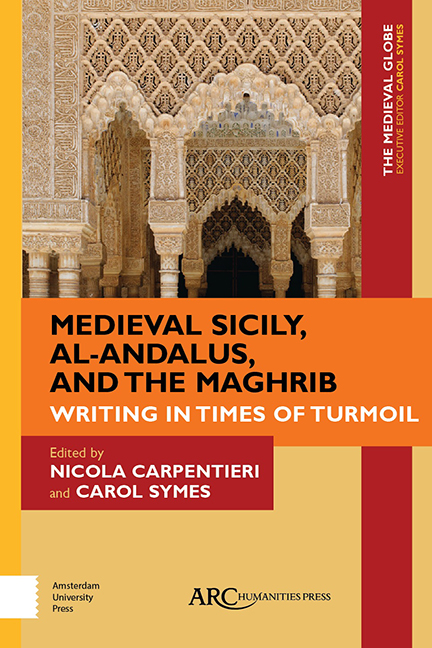Book contents
- Frontmatter
- Contents
- Acknowledgements
- Introduction
- The Indiculus luminosus and the Creation of a Ninth-Century Prophetic Conflict between Christianity and Islam
- Empire and Caliphate in the Life of John of Gorze
- The Writing of Munāẓarāt in Times of Turmoil: Disputations inFatimid Ifrīqiya
- Messaging and Memory: Notes from Medieval Ifrīqiya and Sicily
- “And God Dispersed Their Unity”: Historiographical Patterns in Recounting the End of Muslim Rule in Sicily and al-Andalus
- A Wondrous Past, a Dangerous Present: The Egyptian Temple of Akhmīm and the Martorana Church in Palermo, as Seen through Ibn Jubayr’s Travelogue
- How Does a Moorish Prince Become a Roman Caesar? Fictions and Forgeries, Emperors and Others from the Spanish “Flores” Romances to the Lead Books of Granada
- Index
A Wondrous Past, a Dangerous Present: The Egyptian Temple of Akhmīm and the Martorana Church in Palermo, as Seen through Ibn Jubayr’s Travelogue
Published online by Cambridge University Press: 20 November 2020
- Frontmatter
- Contents
- Acknowledgements
- Introduction
- The Indiculus luminosus and the Creation of a Ninth-Century Prophetic Conflict between Christianity and Islam
- Empire and Caliphate in the Life of John of Gorze
- The Writing of Munāẓarāt in Times of Turmoil: Disputations inFatimid Ifrīqiya
- Messaging and Memory: Notes from Medieval Ifrīqiya and Sicily
- “And God Dispersed Their Unity”: Historiographical Patterns in Recounting the End of Muslim Rule in Sicily and al-Andalus
- A Wondrous Past, a Dangerous Present: The Egyptian Temple of Akhmīm and the Martorana Church in Palermo, as Seen through Ibn Jubayr’s Travelogue
- How Does a Moorish Prince Become a Roman Caesar? Fictions and Forgeries, Emperors and Others from the Spanish “Flores” Romances to the Lead Books of Granada
- Index
Summary
THE END OF the twelfth century was without any doubt an age of turmoil in the Mediterranean region. During this period, Ibn Jubayr (1145– 1217)— the renowned Muslim author from al-Andalus, whose travelogue, the Riḥla, would become a paradigm of this literary genre— made his pilgrimage to Mecca. It had been a century since the First Crusade (1096– 1099), and Latin Christians were still settled in Jerusalem as well as in the most important Syrian coastal towns. Meanwhile, in the Maghrib, the Berber dynasty of the Almohads (1147– 1269) were countering the “Reconquista” by bringing the jihād from western Africa to the Iberian Peninsula, after having extended its dominion from Morocco to as far as Tripolitania. As for Egypt, about ten years before Ibn Jubayr's departure from Granada in 1183, the Sunnī sultans of the Ayyubid lineage, under Saladin (Ṣalāḥ aldīn, 1138– 1193), had put an end to the rule of the Ismāʿīlī Fatimids who had been the powerful heterodox competitors of the Abbasid caliphs since the early tenth century. Yet, in spite of Saladin's attempt to revive Egypt's naval power, and the continued strength of the Almohads’ fleet, navigation in the Mediterranean was no longer under Muslim control, but that of Italian maritime republics. Sicily, after more than two hundred years of Muslim rule, had been conquered by the Normans and, after 1130, was the centre of their Italian kingdom.
All of these events, here summarized in a few lines, entailed great changes at every level within the Muslim societies of the Mediterranean. First, they were affected by the ongoing political fragmentation of the Abbasid caliphs’ empire and its subsequent collapse during the tenth century. Then, as a consequence of the First Crusade, they experienced, for the first time—in limited but significant parts of their own territories— the condition of being subject to enemies of a different religion, language, and geographical and cultural origin: the Franks, al-Ifranj. No less traumatic were the religious and political rifts emerging within Islam, beginning with the ascent to power of the Fatimids,who belonged to the Ismāʿīlī branch of Shi’ism and who proclaimed themselves caliphs in North Africa thanks to the success of their proselytizing campaign among “the Berbers,” al-barbar (as the Arabs called them) and their military support.
- Type
- Chapter
- Information
- Medieval Sicily, al-Andalus, and the MaghribWriting in Times of Turmoil, pp. 127 - 148Publisher: Amsterdam University PressPrint publication year: 2020



